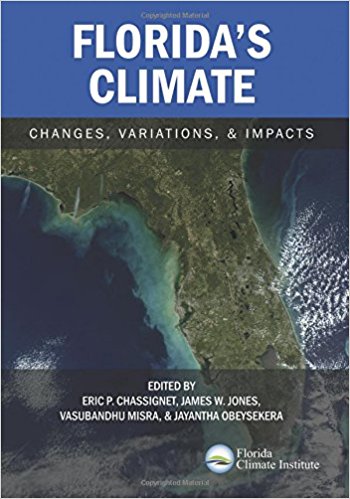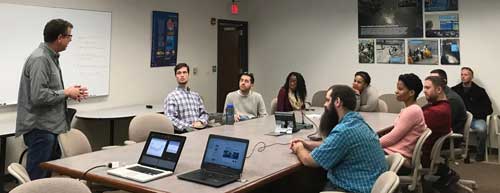A Newsletter for FL BRACE Partners, Collaborators & Stakeholders January 2018
|
|
|
FL BRACE HOSTS "INTRODUCTION TO EVALUATION" WEBINAR
 |
|
 |
Dr. Tisha Holmes
FL BRACE Evaluation Lead |
 Evaluation is an important component of any program's development, but it is often an afterthought or neglected when an agency has many other pressing priorities. But the systematic collection of information about activities, characteristics, and outcomes of programs can be used to make judgements about the program, improve program effectiveness, and/or inform decisions about future program development. Looking at evaluation through the lens of public health, the CDC defines it as "a systematic way to improve and account for public health actions by involving procedures that are useful, feasible, ethical, and accurate." Evaluation is an important component of any program's development, but it is often an afterthought or neglected when an agency has many other pressing priorities. But the systematic collection of information about activities, characteristics, and outcomes of programs can be used to make judgements about the program, improve program effectiveness, and/or inform decisions about future program development. Looking at evaluation through the lens of public health, the CDC defines it as "a systematic way to improve and account for public health actions by involving procedures that are useful, feasible, ethical, and accurate."
In an effort to focus on building the capacity of public health departments and to get health officials and community partners thinking about evaluation before
 |
|
 |
Dr. Ava Holt
FL BRACE Eval/Epidemiology Specialist
|
embarking on a project, FL BRACE hosted a webinar on January 17. The 45-minute presentation,
co-presented by Drs. Tisha Holmes and Ava Holt, covered the basics of evaluation, the evaluation life cycle, and evaluation components using a real-world example.
In addition to providing a good primer on evaluation, the evaluation webinar was developed to support the funding opportunity announcement presently in circulation to public health departments and community partners (see the next article for details). The evaluation webinar was recorded and can be viewed on the
FL BRACE website or on YouTube at
https://youtu.be/70frQjfiix0.
|
|
2018 FL BRACE FUNDING OPPORTUNITY ANNOUNCED
Grants to fund development of evaluation plans tied to
new or existing adaptation projects
 |
|
 |
This funding opportunity specifically addresses the fifth step in the BRACE Framework detailed above.
|
The FL BRACE Program has announced it is soliciting proposals from county health departments and community partners to create an evaluation plan of climate and weather-related adaptations, interventions, or other evidence-based projects. Proposals are due February 21, 2018.
The
BRACE framework, developed by the CDC, is a five-step process. And this funding opportunity specifically addresses the fifth step in the BRACE Framework--evaluating the impact of adaptation strategies and interventions. The evaluation step is designed to determine the value of information attained and the impacts of the activities undertaken. We are looking for health practitioners to prioritize evaluation as a necessary step in the adaptation process and encourage the use of these insights to inform your adaptation efforts.
Florida county health departments and community partners considering a new local adaptation project, or looking to enhance an existing project are encouraged to apply. Note: this grant opportunity is only designed to encourage and fund the development of an evaluation plan tied to a new or existing adaptation project. Future funds may be available for implementation of the plan (i.e., conducting the evaluation and reporting on findings including data results, key points, lessons learned and recommendations).
|
PUBLIC EDUCATION & OUTREACH EFFORTS

"Public Health in the Face of Climate Change" is a topic that garners a great deal of public interest as evidenced by the attendance at the January 2018 FSU Policy Pub lecture series. FL BRACE director Dr. Christopher Uejio spoke and fielded questions at the event about links between public health and climate, as well as ways to improve the ability of the public health sector to respond to health effects related to climate variability.
 The
Florida Climate Institute just published a book that contains a wealth of information about Florida's climate changes, variations, and impacts.
Florida's Climate: Changes, Variations, & Impacts includes a chapter on "Climate Change Impacts on Human Health" co-authored by FL BRACE team member Dr. Kristina Kintziger who is with the Department of Public Health, University of Tennessee Knoxville.The book provides a thorough review of the current state of research on Florida's climate, including physical climate benchmarks; climate prediction, projection, and attribution; and the impacts of climate and climate change on the people and natural resources of Florida. It offers accessible information for students, policymakers, and the general public. The book is
available on Amazon.com.
 Students from FSU Professor Dr. Tisha Holmes' Climate Change and Community Resilience course visited COAPS in November to learn about how science can inform climate adaptation policy and decision making. The course is offered by the FSU Department of Urban and Regional Planning (DURP). And incorporating the best available climate science into public planning and adaptation practices is part of the FL BRACE mission. Pictured: Florida State Climatologist, David Zierden, was one of several COAPS scientists to meet with the students. Students from FSU Professor Dr. Tisha Holmes' Climate Change and Community Resilience course visited COAPS in November to learn about how science can inform climate adaptation policy and decision making. The course is offered by the FSU Department of Urban and Regional Planning (DURP). And incorporating the best available climate science into public planning and adaptation practices is part of the FL BRACE mission. Pictured: Florida State Climatologist, David Zierden, was one of several COAPS scientists to meet with the students.
Danny Brouillette, Climate Services Specialist in the
Florida Climate Center and a member of the FL BRACE team, spoke about the
BRACE project with scientists and students at the
FSU Center for Ocean-Atmospheric Prediction Studies (COAPS). Danny discussed a range of climate phenomena that have public health implications and shared about FL BRACE collaborations with the scientific community,
including our work with the National Weather Service (NWS) and the Florida Department of Health to improve communication about Florida extreme-heat events that have an impact on human health.
If you would like a member of the FL BRACE team to participate or contribute to a community education or outreach event, please contact Tracy Ippolito.
|
FROM THE CDC
The Impacts of Climate Change on Human Health in the United States:
A Scientific Assessment
 |
|
 |
Estimated Deaths and Billion Dollar Losses from Extreme Events in the United States, 2004-2013
|
Climate change is a significant threat to the he
alth of the American people. The Impacts of Climate Change on Human Health in the United States: A Scientific Assessment examines how climate change is already affecting human health and the changes that may occur in the future. It strengthens and expands our understanding of climate-related health impacts by providing a more definitive description of climate-related health burdens in the United States. It builds on the 2014 National Climate Assessment and reviews and synthesizes key contributions to the published literature.
Acknowledging the rising demand for data that can be used to characterize how climate change affects health, this report assesses recent analyses that quantify observed and projected health impacts. Each chapter characterizes the strength of the scientific evidence for a given climate-health exposure pathway or "link" in the causal chain between a climate change impact and its associated health outcome. This assessment's findings represent an improvement in scientific confidence in the link between climate change and a broad range of threats to public health, while recognizing populations of concern and identifying emerging issues. These considerations provide the context for understanding Americans' changing health risks and allow us to identify, project, and respond to future climate change health threats. The overall findings underscore the significance of the growing risk climate change poses to human health in the United States.
|
FL BRACE COMMUNITY ADVISORY GROUP (CAG)
Individuals and organizations in the community serving vulnerable populations
FL BRACE is working to create and strengthen relationships with agencies or organizations who serve vulnerable populations -- including, but not limited to, lower income households, social service organizations, churches, the homeless, older adults (age ≥ 65), and people with preexisting conditions. So if you or someone you know represents an agency or organization whose work with vulnerable populations would benefit from timely heath and climate information, please encourage them to join our Community Advisory Group (CAG).by contacting Ava Holt, FL BRACE.
|
|
|
FL BRACE CONTACTS
Dr. Chris Uejio (Principal/Lead Investigator), Department of Geology, Florida State University
Dr. Tisha Holmes, Department of Urban and Regional Planning, Florida State University
|
Danny Brouillette, Office of the State Climatologist
Dr. Ava Holt, Department of Urban and Regional Planning, FSU
Tracy Ippolito (Project Manager), FSU Center for Ocean-Atmospheric Prediction Studies
|
Dr. Kristina Kintziger, Department of Public Health, University of Tennessee Knoxville
David Zierden, State of Florida Climatologist
|
STAY CONNECTED WITH FLORIDA BRACE


|
|
|
|
|